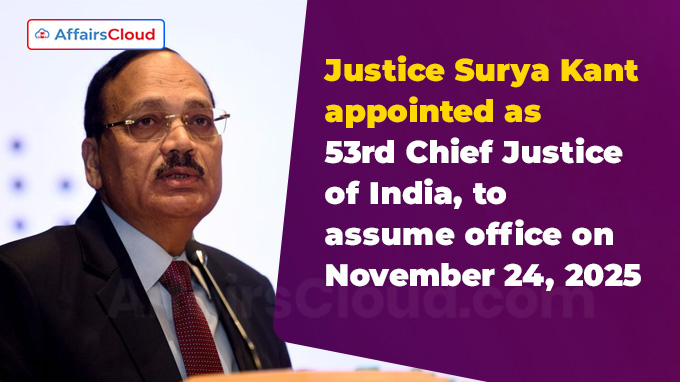In October 2025, the Department of Justice (DoJ), Ministry of Law and Justice (MoL&J), announced that the President of India, Droupadi Murmu, has appointed Justice Surya Kant, the senior-most judge of the Supreme Court (SC), as the 53rd Chief Justice of India (CJI) under Article 124(2) of the Indian Constitution. He will be the first CJI from Haryana.
- He will officially assume the charge on November 24 2025, succeeding incumbent CJI Bhushan Ramkrishna (BR) Gavai, who is set to retire on November 23, 2025.
- He will retire from this post on February 09, 2027 on attaining the age of 65 years.
Exam Hints:
- What? Announcement of the Appointment of new CJI
- Announced by: DoJ, MoL&J
- Who? Justice Surya Kant
- CJI: 53rd
- Appointed by:Droupadi Murmu, President of India
- Article related to Appointment: Clause (2) of Article 124 of Indian Constitution
- Assumes Charge on: November 24, 2025
- Tenure: Till February 09, 2027(upon attaining age of 65 years)
- Predecessor: Bhushan Ramkrishna (BR) Gavai
- Significance: First CJI from Haryana
About Surya Kant:
Law Practice: Justice Surya Kant started his law practice from his home town i.e. at District Court in Hisar in Haryana in 1984 and later, he shifted his practice to the Punjab and Haryana High Court(HC) in Chandigarh in 1985.
Youngest Advocate General: On July 7, 2000, at age 38, he became the youngest Advocate General of Haryana and was designated Senior Advocate in March 2001.
Judicial Career: In January 2004, he was appointed as a permanent judge to the Punjab and Haryana HC.
- He was appointed as the CJ of the Himachal Pradesh (HP) HC on October 05, 2018, before being elevated to SC on May 24, 2019.
NALSA: He served as a member of National Legal Services Authority (NALSA)’s governing body (2007–2011) and has been its Executive Chairman since May 24, 2025.
Key Judgments: Over his four-decade-long judicial career, he has delivered several landmark judgments, including being part of the 5-judge bench that upheld the abrogation of Article 370 (2023) and the February 2024 verdict that struck down the Electoral Bonds Scheme while upholding the One Rank One Pension (OROP) scheme for the armed forces.
Constitutional Provisions Related to CJI:
Tenure: As per Article 124(2) of the Constitution of India, there is no fixed tenure prescribed for a SC Judge or the CJI. However, it makes certain provisions regarding this: he holds office until he attains the age of 65 years;
- He can resign his office by writing to the President of India;
- He can be removed from his office by the President of India on the recommendation of the Parliament.
Qualification: As per Article 124(3) of the Constitution, a person must be an Indian citizen and should have served as a High Court Judge for at least 5 years, or practised as a High Court advocate for 10 years, or be a distinguished jurist in the opinion of the President.
Removal of Judges: As per Article 124(4) of the Constitution, a Judge of SC/CJI can be removed from his office by an order of the President of India only after the Parliament presents an address supported by each of the parliament.
- The CJI can be removed on two grounds i.e. proved misbehavior or incapacity.
- The procedure for the removal of a judge of SC/CJI by the process of impeachment is regulated by the Judges Enquiry Act (1968).
Appointment of Acting CJI: As per Article 126(1) of the Constitution, it provides for the appointment of an Acting CJI when the office of the CJI is vacant or the CJI is temporarily unable to perform his duties.
Acting President of India: As per the provisions of Article 65 of the Indian Constitution and the President (Discharge of Functions), Act, 1969, in the event of the occurrence of vacancies in the offices of both the President and Vice –President of India, due to any these reasons: death, resignation or removal, or otherwise, then, the CJI (or, in his absence, the senior-most judge of the SC) will discharge the functions of the President of India until a new President elected.
- In 1969, due to the death of the President of India Zakir Hussain and the resignation of VV Giri as Vice President of India, then, CJI Mohammad Hidayatullah acted as the President of India from July 20 to August 24, 1969.





